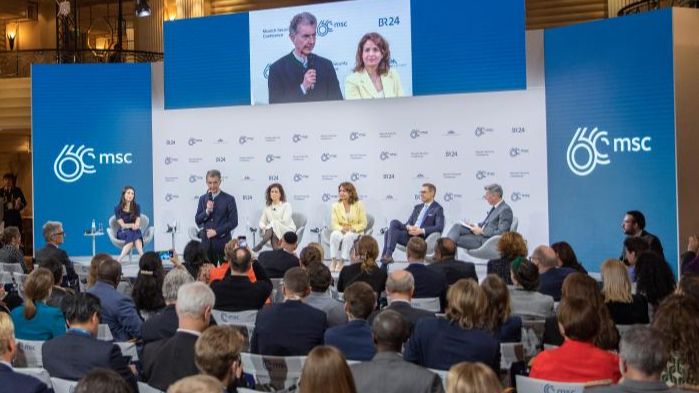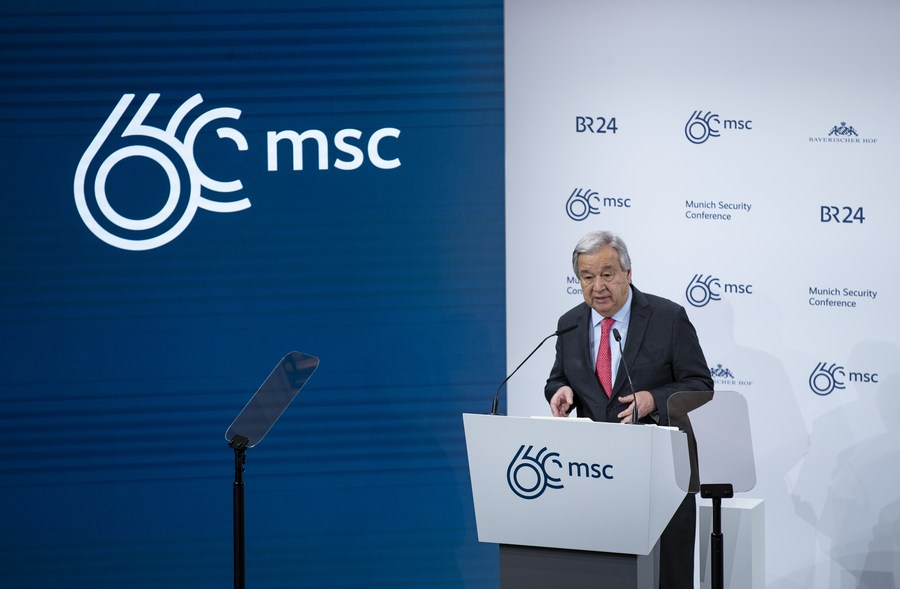
Munich Security Conference (MSC) Chairman Christoph Heusgen speaks during the closing of the 60th MSC in Munich, Germany, February 18, 2024. [Photo/Xinhua]
By He Zhigao
The Munich Security Conference (MSC) is one forum for debating rather than deciding international security policies. In recent years, the key words of the Munich Security Conference Report have become the focus of discussion, such as the concepts of "Westlessness," "unlearning helplessness" and "lose-lose." The Munich Security Report 2024 covers four regions – Eastern Europe, the Indo-Pacific, the Middle East and the Sahel – as well as three policy areas – globalization, climate policy and technological progress.
The MSC is a product of history and a witness of history, reflecting the views of Germany and even Europe in the profound changes of the international order. Europe, no doubt a spectator and a witness, is more sensitive to the dramatic changes in its geostrategic environment. MSC 2024 has not brought joy to Europe, but more anxiety, hesitation and reflection. The lose-lose dynamics are already unfolding in many policy fields and engulfing various regions.
First, this conference is being held under the dual impact of two major regional conflicts, the Russia-Ukraine conflict and the Palestinian-Israeli conflict. How to solve the challenges brought by regional conflicts is an urgent issue for Europe and even the global community.
Second, 2024 is a "super election year"; not only will the European Parliament election be held in June, but also the high-profile U.S. election will be held in November. How to face the impact of a potential Trump return on trans-Atlantic cooperation is the "sword of Damocles" hanging over European decision-makers' heads, and Europe needs to think more about how to strengthen autonomy with "America First."
Third, security have become a hotspot in the international community, and economic security, ideological security and traditional security are tied together. How to solve the security dilemma has become a breakthrough point for Europe to reflect on its own strategy. Therefore, the theme of this conference is to discuss how the international community can avoid the trap of strategic competition and how to avoid the vicious circle of a zero-sum game.

United Nations Secretary-General Antonio Guterres speaks during the opening of the 60th Munich Security Conference (MSC) in Munich, Germany, February 16, 2024. [Photo/Xinhua]
The world has entered a period of new turbulence and transformation, and most global actors are watching and adjusting their strategies accordingly. The UN Secretary-General Antonio Guterres has said that the global community is more fragmented and divided than at any time during the past 75 years. Europe is struggling to decide how to position themselves within the changing world order.
If Europe emphasizes ideology and values, and seeks cooperation with transatlantic partners and like-minded partners, it will inevitably fall into a zero-sum game; the "de-risking" strategy will serve geopolitical competition; global players would all be losers. If Europe focuses on "absolute gains" instead of "relative gains," and deepens pragmatic economic cooperation with the Global South including China, a new cold war will be avoided.
China-related topics are attracting more attention in the conference. On February 17, 2024, by giving a speech during the "China in the World" session at MSC, Chinese Foreign Minister Wang Yi stressed China's position on major international issues. The clear message for Europe and the whole world is that China stands firm as a stabilizing force in this turbulent world. China, which helps facilitate the stability and continuity of the international order, is a responsible major country to work with, and "shutting China out of global trade would be a historic mistake."
The absence of cooperation would be a big risk. Protectionism and unilateralism have impacted the world economy and global order. There is a real risk that needs to be focused on: An increasing number of countries are ending up in a lose-lose situation. It is no longer about who gains more, but only about who loses less. As the Munich Security Report points out, the lose-lose dynamics that are spurred if ever more governments prioritize relative payoffs should rather engage in positive-sum cooperation and invest in an international order that can still help increase for the benefit of all.
Therefore, we should strengthen the win-win nature of cooperation, and reject the lose-lose dynamics of rivalry, and jointly promote an equal and orderly multipolar world, and universally beneficial and inclusive economic globalization.
He Zhigao, a special commentator on current affairs for CGTN, is an associate professor at the Institute of European Studies, and a research fellow of the National Institute for Global Strategy of the Chinese Academy of Social Sciences.

 中文
中文



